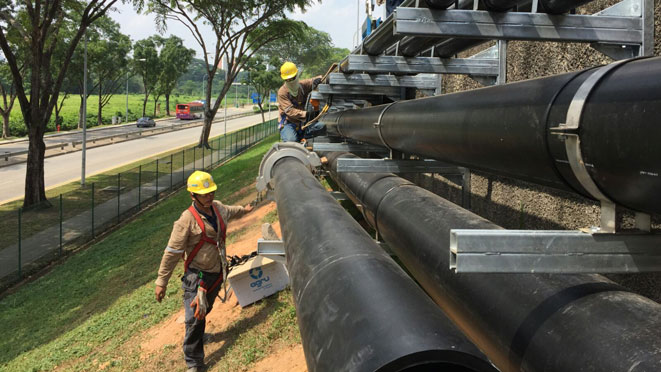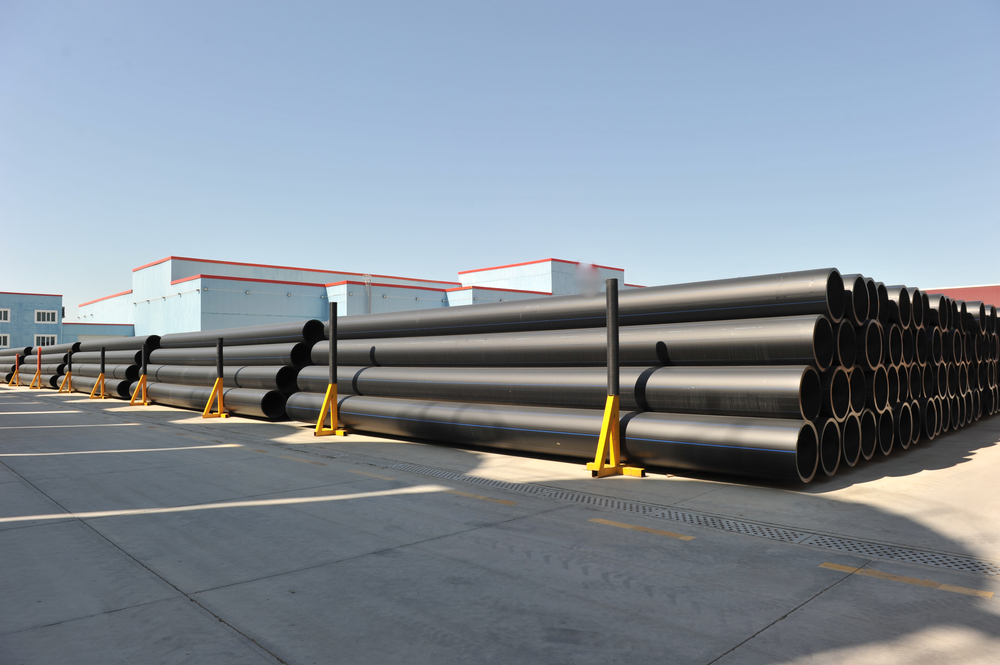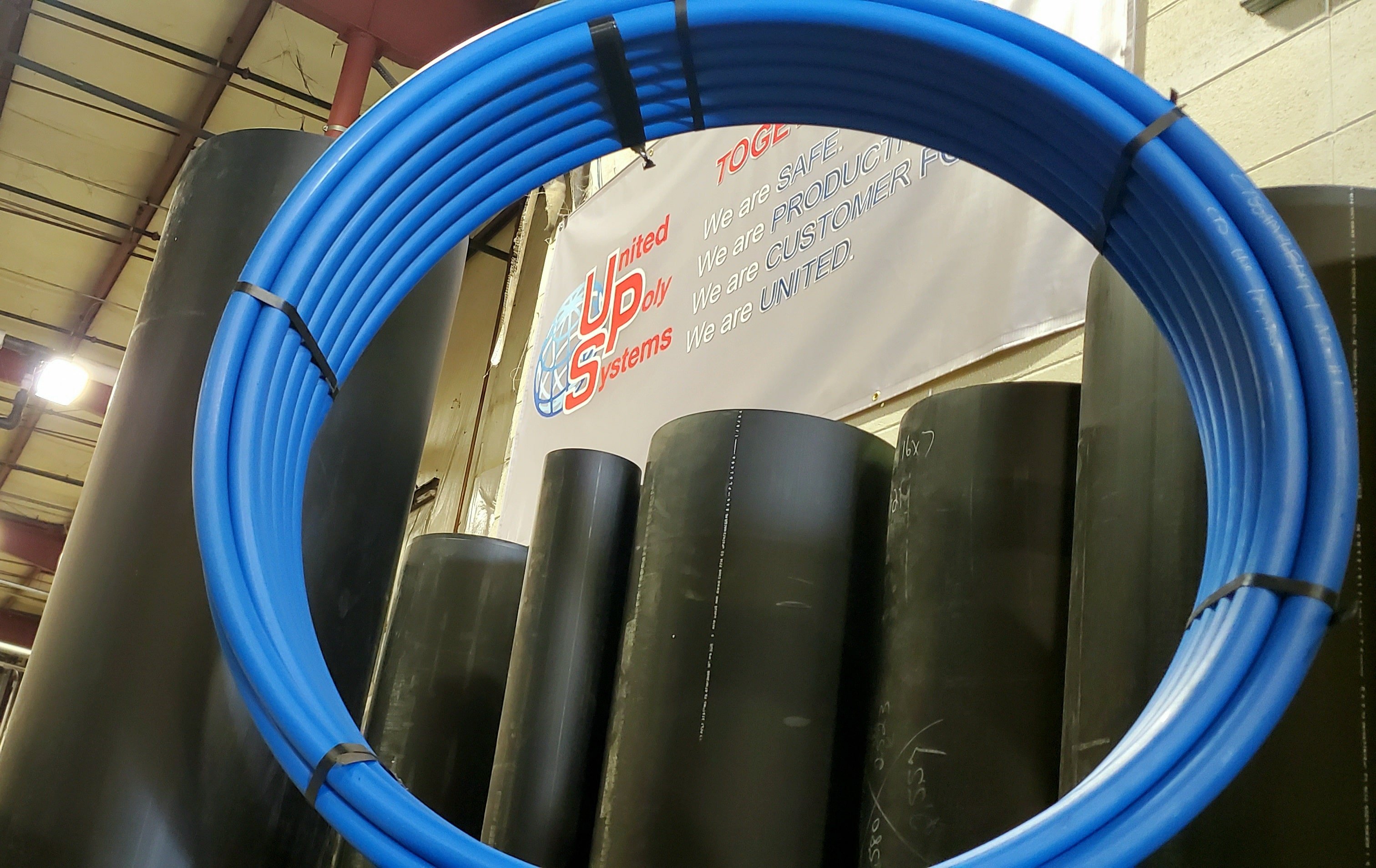HDPE Pipe Supplier support: why service matters
Wiki Article
Checking Out the Leading Pipeline Manufacturers: Quality, Integrity, and Innovation
The pipeline manufacturing market stands at the crossway of innovation, top quality, and reliability, driven by leading firms such as Tenaris and Vallourec. These suppliers are not only committed to creating high-performance materials but are also pioneering lasting methods that deal with modern environmental issues (HDPE Pipe Supplier). As we check out the standards that define quality in pipeline services, it comes to be noticeable that the landscape is quickly advancing. What certain advancements are emerging, and just how are these advancements forming the future of pipeline facilities? The responses might redefine market criteria in manner ins which are not yet totally comprehendedLeading Manufacturers Introduction
In the domain of pipeline manufacturing, numerous principals become leaders, each adding considerably to the market's landscape. Business such as Tenaris, Vallourec, and JFE Steel have developed themselves as frontrunners by consistently providing premium items that meet rigid market requirements. Tenaris, renowned for its innovative services, concentrates on smooth and bonded pipelines, providing largely to the oil and gas industry. Vallourec, a French multinational, concentrates on the production of costs tubular solutions, highlighting sustainability and progressed technology in its manufacturing procedures.Similarly, JFE Steel, a significant Japanese manufacturer, is recognized for its extensive variety of steel pipelines, specifically those used in energy and framework projects. Their commitment to r & d has enabled them to produce high-performance materials that stand up to harsh ecological conditions. Furthermore, firms like U.S. Steel and National Oilwell Varco have broadened their market existence by expanding their product offerings and enhancing operational efficiencies.
These leading makers not just dominate the marketplace but additionally drive technology within the sector, establishing standards for quality and reliability that gamers aim to attain. Their contributions are important for satisfying the enhancing need for long lasting and effective pipeline options worldwide.
Standards for Quality Analysis
Quality analysis in pipeline manufacturing rests on 2 crucial criteria: material resilience criteria and making process performance. Guaranteeing that materials satisfy extensive toughness criteria is necessary for the long life and dependability of pipelines. In addition, enhancing the manufacturing procedure can boost efficiency while keeping excellent quality, ultimately influencing general performance and safety and security.Material Sturdiness Requirements
Assuring the long life and reliability of pipeline materials is important for preserving facilities stability and functional effectiveness. Material resilience criteria play an essential function in evaluating the quality of pipes, dictating the efficiency and lifespan of the materials utilized in construction. Manufacturers have to comply with a variety of extensive standards, including those established by companies such as ASTM International and the American Petroleum Institute (API)These requirements examine different elements, including rust resistance, tensile strength, and fatigue performance. For example, pipes used in harsh atmospheres need materials that can withstand chemical degradation, while those based on high-pressure conditions need to show exceptional tensile stamina.
Additionally, variables such as temperature fluctuations and ecological problems should be considered, as these can substantially affect material actions gradually. Manufacturers commonly utilize advanced screening approaches, consisting of accelerated aging examinations, to mimic lasting wear and assurance that products fulfill or exceed sector benchmarks.
Manufacturing Process Efficiency
Manufacturers' capability to enhance making process efficiency is crucial for generating high-grade pipelines that fulfill rigorous industry criteria. Performance in manufacturing straight affects price monitoring, production timelines, and overall item integrity. To attain this, leading pipeline makers carry out innovative techniques such as lean manufacturing, automation, and real-time data analytics.Lean making concepts are crucial in decreasing waste and optimizing source usage. By enhancing processes and getting rid of redundancies, suppliers can boost performance while making sure constant quality. Automation innovations, consisting of robotics and computer system numerical control (CNC) devices, play a crucial function in boosting precision and minimizing human error, consequently elevating the reliability of the last product.
In addition, the usage of real-time data analytics allows manufacturers to keep an eye on manufacturing procedures continuously, enabling them to identify bottlenecks and make prompt modifications. This positive technique not just enhances performance yet likewise sustains quality assurance procedures by making certain compliance with regulative criteria.
Integrity in Pipeline Solutions
Reliability in pipeline remedies is paramount, as it directly affects the safety and security and efficiency of liquid transport systems. Trick aspects include the durability of materials used, adherence to extensive testing and certification standards, and the incorporation of cutting-edge material solutions that improve performance. Understanding these components is necessary for manufacturers intending to provide trustworthy pipeline infrastructure.Relevance of Toughness
Attaining toughness in pipeline services is important, as it straight impacts the long-lasting performance and security of framework. Durable pipes are vital for decreasing upkeep expenses and reducing the probability of catastrophic failures. This reliability is specifically crucial in markets such as oil and gas, water, and wastewater administration, where the repercussions of pipeline failure can be extreme, both economically and eco.The materials and making procedures used by pipeline manufacturers play a significant duty in figuring out the sturdiness of the last item. Making use of top quality basic materials, advanced technologies, and cutting-edge style principles assures that pipes can stand up to numerous stress factors, consisting of pressure changes, temperature variations, and harsh settings.
The toughness of pipes is closely connected to their capability to withstand outside elements such as dirt activity, seismic activity, and chemical direct exposures. Reliable rust protection approaches, such as coverings and cathodic protection, even more improve the durability of pipes, guarding them versus damage with time.
Investing in resilient pipeline remedies ultimately converts to enhanced operational performance, decreased downtime, and improved safety and security, attesting the essential value of resilience in modern pipeline manufacturing.
Evaluating and Accreditation Criteria
In the domain of pipeline solutions, strenuous testing and certification criteria are vital to guarantee the integrity and safety of infrastructure. These standards work as criteria for evaluating the efficiency and longevity of pipeline materials and systems, confirming they meet particular governing and market demands.Checking procedures typically encompass various methodologies, consisting of stress screening, hydrostatic assessments, and non-destructive testing strategies. These analyses are vital for recognizing possible weaknesses or problems in the products prior to they are released in real-world applications. Furthermore, certification by identified companies assurances that producers adhere to established guidelines, which cultivates trust fund amongst stakeholders, including engineers, professionals, and end-users.
Several leading pipeline manufacturers involve in continual surveillance and renovation of their screening protocols to adapt to developing industry criteria and technological innovations. Conformity with standards such as ASTM, ASME, and ISO not just improves product dependability however also decreases the threat of environmental cases connected with pipeline failings.
Cutting-edge Product Solutions
The advancement of ingenious material remedies has transformed the landscape of pipeline manufacturing, enhancing both performance and longevity. Advanced products such as high-density polyethylene (HDPE), cross-linked polyethylene (PEX), and composite products have emerged as game-changers, using premium resistance to corrosion, temperature variations, and pressure variations. These products not only extend the lifespan of pipelines yet likewise reduce maintenance expenses, making sure dependable long-term efficiency.Manufacturers are significantly embracing clever products that include sensing units for real-time monitoring. This modern technology permits for aggressive upkeep, substantially improving integrity by identifying leaks or structural weak points before they rise right into important failures. The assimilation of nanotechnology has additionally brought about the growth of finishes that boost the longevity of pipes versus abrasion and chemical direct exposure.
Sustainability is one more vital emphasis, with suppliers discovering bio-based composites and recyclable products that lessen ecological influence. As governing standards remain to advance, the emphasis on innovative material remedies comes to be paramount in conference strict security and ecological needs. Ultimately, these developments not only improve the reliability of pipeline systems but additionally contribute to the total efficiency and sustainability of power transport infrastructures.
Advancements in Pipeline Technology
Technologies in pipeline technology are revolutionizing the sector by improving efficiency, security, and environmental sustainability. Current developments focus on wise pipeline systems that make use of sensors and IoT modern technology to monitor conditions in genuine time, allowing proactive upkeep and reducing the risk of failures. These systems can spot leaks, pressure adjustments, and other abnormalities, permitting rapid action and lessening environmental effect.In addition, the development of advanced products, such as composite and corrosion-resistant alloys, substantially extends the lifespan and reliability of pipelines. HDPE Pipe Supplier (American Plastics LLC HDPE Pipeline Manufacturer). These products minimize maintenance costs and improve efficiency in extreme atmospheres, making them perfect for water, oil, and gas transport
Automation and robotics are playing an essential role in pipeline building and assessment. Drones and robot gadgets help with surveys and assessments of hard-to-reach locations, guaranteeing extensive inspections without endangering security.
Moreover, ingenious designs, such as modular pipeline systems, permit for higher flexibility in setup and adjustment, accommodating the dynamic requirements of the power sector. Together, these technological advancements not just improve operational efficiency however additionally add to a more durable and lasting pipeline framework, leading the way for a greener future.
Study of Success
Across different fields, effective applications of innovative pipeline modern technologies demonstrate significant renovations in operational performance and safety and security. One remarkable case is the implementation of clever pipeline surveillance systems in the oil and gas industry, where real-time data analytics have actually lowered leak discovery times by over 50%. This not just lessens environmental dangers however likewise improves the overall stability of pipeline framework.
Additionally, a major manufacturer applied robot evaluation innovations in its pipeline maintenance operations, resulting in a 40% improvement in inspection effectiveness. This method has streamlined maintenance routines and considerably reduced downtime.
These instance research studies highlight how prominent pipeline producers are leveraging innovative technologies to foster integrity and functional quality, inevitably establishing new standards for the industry. As these successes remain to unravel, they lead the way for further innovations in pipeline manufacturing and monitoring.

Ecological Sustainability Practices
Frequently, pipeline makers are focusing on environmental sustainability practices to alleviate their environmental footprint and boost the longevity of their products. This commitment is shown in numerous campaigns focused on decreasing waste, saving power, and utilizing lasting materials throughout the manufacturing procedure.
Numerous producers are embracing sophisticated modern technologies that decrease exhausts and energy usage. As an example, the integration of automated systems and energy-efficient equipment helps improve manufacturing while lowering dependence on nonrenewable fuel sources. Additionally, firms are significantly transforming to eco-friendly materials, such as recycled steels and bioplastics, which not only reduce the environmental impact but also advertise a round economic situation.
Furthermore, pipeline producers are executing rigorous lifecycle analyses to examine the environmental effects of their items from creation to disposal. This strategy enables them to identify chances for improvement and foster liable sourcing and waste management methods.
Collaboration with ecological organizations even more enhances these initiatives, as suppliers seek to align their operations with worldwide sustainability objectives. Eventually, these ecological sustainability methods not just contribute to a much healthier world yet likewise setting producers as liable leaders in the market, attracting environmentally aware stakeholders and clients alike.
Future Fads in Pipeline Manufacturing
As the demand for a lot more lasting and efficient facilities expands, pipeline manufacturing is poised for considerable developments that will certainly improve the industry. Secret patterns anticipated in the coming years consist of the integration of sophisticated products, such as composite and corrosion-resistant alloys, which improve resilience while lessening environmental effect. Manufacturers are additionally anticipated to adopt ingenious manufacturing strategies, like additive manufacturing and automation, to simplify processes, decrease waste, and reduced costs.The increase of wise pipeline technologies, integrating sensing units and IoT devices, will enable real-time tracking and anticipating upkeep, therefore improving security and functional performance. This digital makeover will certainly not only maximize source administration yet also promote compliance with stringent environmental policies.
Sustainability will remain a central focus, driving makers to spend in environmentally friendly methods, including energy-efficient production methods and reusing campaigns. As the global focus on environment modification magnifies, pipeline producers will require to adjust by establishing options that satisfy both ecological and financial demands.
Often Asked Concerns

What Industries Mainly Make Use Of Pipeline Products From These Manufacturers?
Pipeline products are largely made use of in markets such as oil and wastewater, water and gas monitoring, chemical mining, handling, and building and construction. These markets count on efficient, resilient, and secure transportation of products and liquids.
Just How Do Manufacturers Ensure Compliance With International Pipeline Specifications?
Manufacturers guarantee conformity with global pipeline standards by executing extensive quality assurance procedures, performing regular evaluations, sticking to established regulative frameworks, and buying employee training to advertise recognition and understanding of safety and security and top quality demands.What Is the Typical Lifespan of Pipelines From Leading Manufacturers?
The ordinary life-span of pipes from leading manufacturers usually varies from 30 to 100 years, depending on product, environmental conditions, and upkeep practices. American Plastics LLC HDPE Pipeline Manufacturer. Normal evaluations and adherence to market requirements significantly influence longevity and performanceAre There Certifications Certain to Pipeline Manufacturing Quality?
Yes, different certifications exist for pipeline manufacturing high quality, consisting of ISO 9001 for quality management systems and API standards specific to pipes. These accreditations guarantee adherence to rigorous security, performance, and ecological requirements within the sector.Just How Do Manufacturers Manage Pipeline Maintenance and Repair Works?
Manufacturers generally implement a positive maintenance approach that includes regular evaluations, keeping track of systems for very early detection of concerns, and a structured repair service protocol. This technique guarantees pipeline stability, decreases downtime, and improves total functional efficiency.Quality assessment in pipeline manufacturing hinges on two essential standards: product longevity criteria and producing process effectiveness - Pipeline Manufacturer. Product resilience criteria play a crucial function in reviewing the quality of pipes, determining the performance and life-span of the materials utilized in building and construction. The materials and manufacturing procedures used by pipeline manufacturers play a considerable duty in establishing the sturdiness of the last item. The average life expectancy of pipes from leading suppliers generally ranges from 30 to 100 years, depending on product, ecological conditions, and maintenance techniques. Yes, different certifications exist for pipeline manufacturing HDPE Pipe Manufacturing Texas top quality, including ISO 9001 for high quality administration systems and API requirements certain to pipes
Report this wiki page